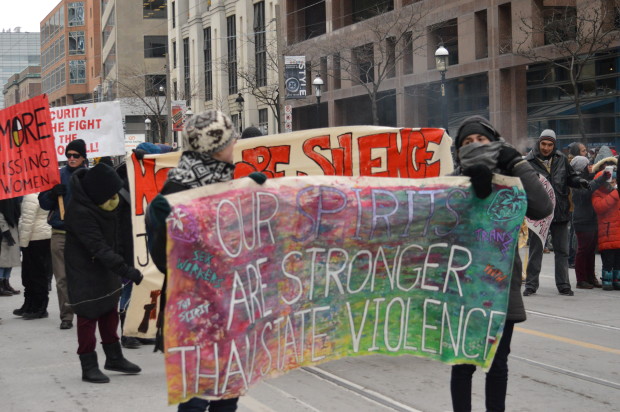

Panel discussion tour to end violence against women amplifies Indigenous voices
Canada Nov 23, 2016 Madalene Arias

A year into the federal government’s national inquiry into missing and murdered indigenous women, many families remain disappointed and desperate for answers. To put the spotlight on this important set of issues, Canadian social justice group Kairos and Indigenous rights groups have teamed up with an international partner from Colombia for a panel discussion tour set to begin at the University of Toronto on Friday.
The panels fall within the November 25 to December 10 time period formally designated by the United Nations as a time of activism to end violence against women. Kairos has organized a series of public events under the name NO MAS! End Violence Against Women Now! to commemorate these days.
Toronto’s panel discussion will begin at 7 pm and run until 9 pm at U of T’s Multi-Faith Center. Their tour will be in Montreal on Tuesday Nov. 29, and in Ottawa on Thursday Dec. 1, collaborating with local Aboriginal groups on each date. All panel discussions will run from 7 pm to 9 pm.
According to Rachel Warden, Women of Courage and Latin America Partnerships Coordinator at Kairos, there are plenty of reasons to highlight violence against women in Canada this year.
“It’s an opportunity to profile the work done by Indigenous women here in Canada, to amplify those voices,” says Warden.
Isabel Caicedo Polanco of Colombia’s Organización Femenina Popular (Popular Feminist Organization) will speak at all the discussions throughout the tour.
Professor of Latin American History at the University of Toronto Luis van Isschot is a co-sponsor of the event. He worked in Polanco’s hometown of Medio Magdalena, a region he said has been hit the hardest by the armed conflict that has plagued the country for five decades.
van Isschot says Polanco’s visit to Canada is a timely one as Colombia finalizes a peace accord.
“She has a lot of insight to offer into how ordinary people see the prospects for peace, from a woman’s point of view in her case. And I think that’s why it’s so valuable to hear her speak. We listen to politicians speak about peace, but we know that there is often times a disconnection between the way politicians envision peace and the way ordinary people wish to see it,” he says.
The panel discussion in Toronto will also include representatives from No More Silence and Families of Sisters in Spirit, both of whom will address the root causes of violence against Indigenous women in Canada. They will also discuss ways to bring truth and justice back to these women.
The Native Women’s Association of Canada (NWAC) will join the panelists in Ottawa. They too want justice for Indigenous women, and they also want their government funding back.
According to NWAC president Francyne Joe, the organization lost 60 per cent of their core funds during the Harper years.
The staff cuts that followed have made it difficult for the association to maintain up-to-date records and research.
The current federal government is demanding that they provide as much documentation, research assistance and advisory services as they did 10 years ago.
“It’s quite difficult for us to continue at this pace so we’re having to contact partners such as Kairos,” says Joe.
She says members of the U.N.’s Committee on the Elimination on Discrimination Against Women visited Canada and made 38 recommendations for the national inquiry into MMIW.
The federal government has only implemented one.
“As of today, nothing has happened. The families are not getting any answers from this inquiry,” says Joe.
Relatives of the missing women often call NWAC, asking when they will have their opportunity to speak to the commissioners. Many want to know why the government has yet to launch a website for the inquiry, or why there is no hotline for them to call.
Joe says NWAC will draw attention to police relations with Indigenous women and police accountability.
Recently, several Aboriginal women in Val D’Or, Quebec came forward with accusations of abuse from police officers in the city and rural areas.
The prosecutors said the investigation did not produce sufficient evidence to support the allegations, and no charges were laid against Quebec police.
NWAC released a press release calling for concerned citizens to join them at the Human Rights Monument to show their support for the women who came forward.
Joe says this panel discussion will serve as a tool to educate non-indigenous communities, and she hopes that this will make Canadians care about Indigenous people.
“If we can deal with these issues on the Indigenous front, really, it’s going to trickle down to the non-Indigenous front and be of benefit to Canadian society.”






